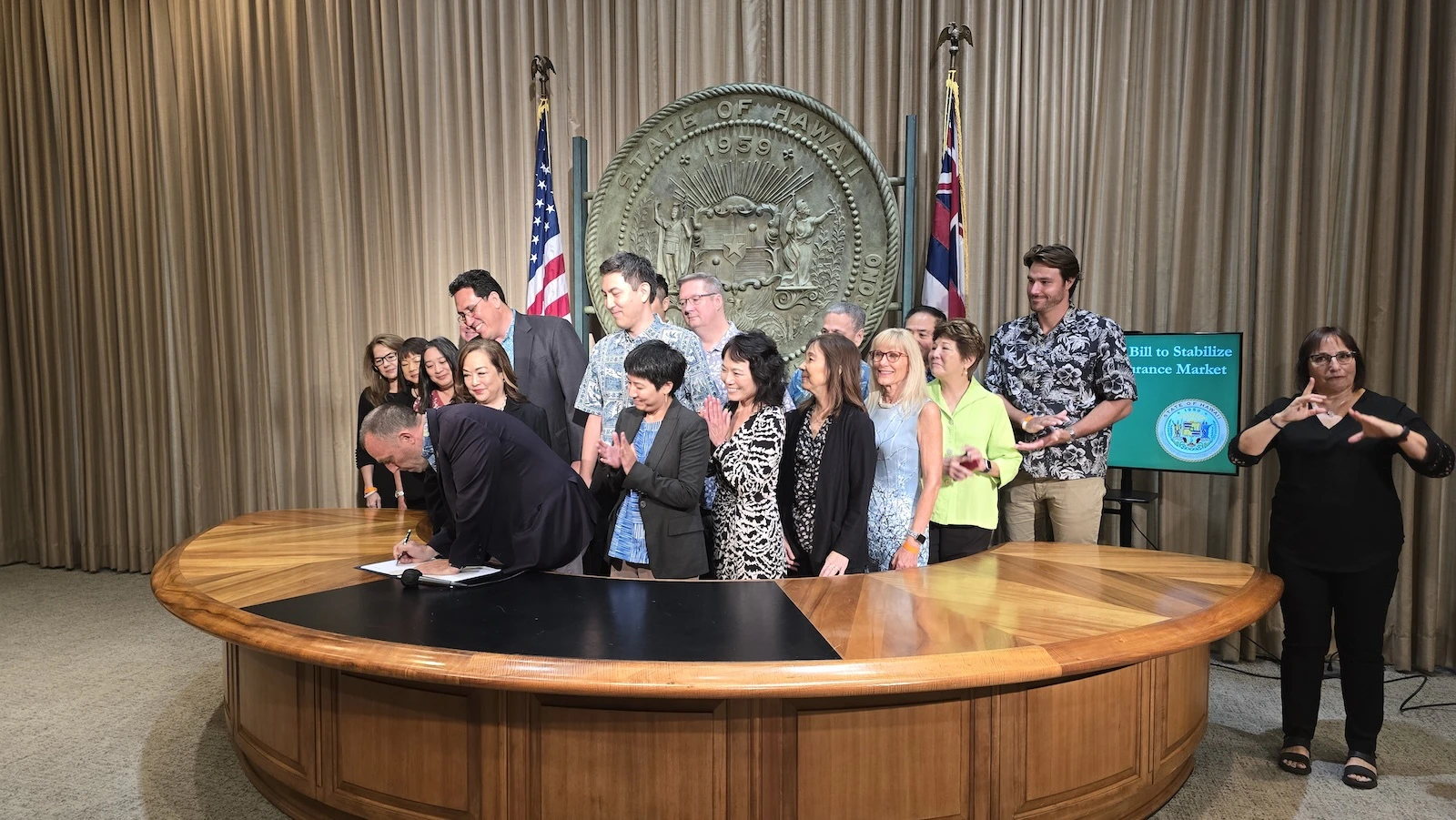In the wake of surging premiums and dwindling options, legislation signed Monday by Gov. Josh Green aims to help stabilize Hawai‘i's unstable property insurance market.
"This bill is here because it has become increasingly clear that our housing market was unstable," Green said during a bill signing at the Hawaiʻi State Capitol. "After the [Maui] fires, the difficulty insuring ourselves was setting the condo market upside down."
There are several components to Senate Bill 1044, now Act 296.
It reactivates the Hawai‘i Hurricane Relief Fund — initially formed in 1993 after Hurricane Iniki devastated Kaua‘i in September 1992 — to "provide insurance coverage in scenarios where the private market fails to do so," an announcement from the Governor's Office noted.
HHRF was established to address gaps in property insurance coverage after Hurricane Iniki hit the Islands, when many insurers withdrew from the hurricane insurance market, according to the announcement. Over time, it ceased and remained dormant until Green reactivated the fund in 2024 "to address the growing instability in the property insurance market caused by major climate events, rapidly rising premiums and a decrease in available insurers, which created significant barriers to obtaining coverage for many [Association of Apartment Owners]."
The legislation also "enhances the power" of the Hawai‘i Property Insurance Association to offer more coverage options, establishes the Condominium Loan Program to help buildings remain insurable and requires the state's insurance commissioner to conduct a study to develop "sustainable strategies for market stabilization," the announcement said.
There are several factors at play behind the new law.
Language in the bill notes that the condominium insurance market place was already "shrinking," even before wildfires ravaged parts of Maui in August 2023, which, in part, caused premiums to significantly climb.
Mortgage lenders also continue to require homeowners in the Islands to carry hurricane insurance, even though the state has avoided "direct, major" impacts from such storms in the years since Hurricane Iniki, it continues.
Additionally, the legislation states that because insurance premiums for full replacement hurricane coverage for condominium buildings and complexes have risen so high, it's estimated than 375 to 390 buildings have renewed their hurricane insurance policies with less than 100% coverage. This reduction is "creating complications and adverse consequences for every person and entity associated with condominiums in Hawaii, from lenders and insurance agents to buyers and sellers of condominiums," the measure reads.
"I'm very grateful that we're here today to address this this silent crisis that's pushing thousands of residents to the brink, skyrocketing insurance costs with no alternatives in sight," state Sen. Jarrett Keohokalole, chair of the Senate Committee on Consumer Protection and Commerce, said during Monday's bill signing ceremony. "This bill really lays groundwork for relief on that, especially for seniors who, with no alternatives, are the most vulnerable to the price spikes or the cancelations that we've been seeing throughout the community. This bill really matters to them."
Keohokalole says the legislations also "sets up a firewall" to protect potentially hundreds of thousands of residents "whose lives could be thrown into disarray if there is a broader insurance market cancelation or another catastrophe like Lahaina."
Acting Insurance Commissioner Jerry Bump, said that the HHRF began receiving applications on June 24 from condo and home associations' insurance producers. In the first week alone, 80 applications were received for quotes and 10 policies were issued, he said.
"Anecdotally, we're already hearing a considerable amount of savings on two fronts, either directly by purchasing the policy through the HHRF for the hurricane coverage of an association, or through price pressure that it's putting on the rest of the market to bring their prices down," Bump said. "That's also a very good result."
Bump, who's been in the acting role since Feb. 1, told Aloha State Daily after the bill signing that a "significant percentage of our population" live in condominiums, "and all of them have seen their association fees go through the roof in the last two years, mostly being driven by the insurance costs that have been occurring."
The newly signed legislation provides "additional insurance capacity to the market, which will hopefully, what it's titled, stabilize the insurance market, [and] bring the prices back down to a more reasonable level."
But what does this mean for Hawai‘i's housing market?
Trevor Benn, president of the Honolulu Board of Realtors, told ASD Tuesday in an emailed response to questions that the legislation is a "good solution for properties that are unable to obtain competitively priced insurance."
"The loan program included as a key component in this legislation to assist with building repairs is equally meaningful," he continued. "It provides another tool for AOAOs to utilize, especially for buildings that may be less concerned about securing salable loans for purchase and more focused on the ability of the building itself to borrow for repairs."
While Benn said the organization applauds the governor and lawmakers for this "important step" to address rising insurance costs, more work is needed.
"Addressing rising property insurance costs locally is tied to the increasing related climate claims that we are seeing take place on the continent," said Benn. "The Honolulu Board of Realtors is committed to ensuring consumers get what they paid for. One question is 'Is 100% replacement insurance necessary?' Given there has never been a hurricane that has totally destroyed a building here in the Islands, being able to partially insure buildings could be a cost savings to consumers. "
Benn says that the BOR supports "sensible" insurance requirements that would allow each building's individual or particular risks to be underwritten as opposed to a mandate requiring the owner insure 100% of the replacement costs.
When asked about the impact the newly law would have on condo sales, Benn said that if it lowers the cost of insurance premiums, that reduces the overall monthly costs to buyers, "and condo sales velocity should increase."
You can check out the full measure here.
Stephanie Salmons can be reached at stephanie@alohastatedaily.com.





